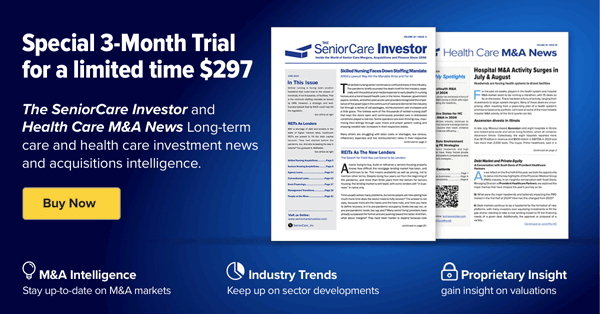Healthcare M&A activity has been facing a decline in recent years, a trend highlighted by data captured in the LevinPro HC database. During the first three quarters of 2024, 1,101 healthcare services deals were announced—a drop of nearly 8% compared to the 1,191 deals recorded during the same period in 2023, and an 18% decline from the 1,340 deals completed in the first three quarters of 2022, which was a record-breaking year for healthcare M&A. Across all healthcare verticals, including the healthcare technology sectors, the total number of deals in the first three quarters of 2024 stood at 1,510, reflecting a more than 10% decrease from the 2023 figures, and a nearly 20% drop compared to 2022. However, when compared to pre-pandemic years like 2019 and 2018, these levels of activity still represent a historically strong M&A market.
The recent decline reflects growing challenges in the healthcare services market, where rising interest rates and stricter regulatory environments have created headwinds for both buyers and sellers in recent years. Key sectors, including Home Health & Hospice and Physician Medical Groups, have particularly struggled to maintain their momentum. Furthermore, private equity (PE) activity has waned. In Q3 2024, PE accounted for 34% of the 505 healthcare deals announced, a notable decrease from 38% of the 520 healthcare deals in Q3 2023.
Operational disruptions and increased labor costs have added to the slowdown, prompting many industry players to adopt a cautious “wait-and-see” approach. The result has been fewer deals, smaller deal sizes and an increased focus on stabilizing operations rather than pursuing aggressive growth strategies.
Yet, in a year marked by a slowdown in healthcare M&A activity, Agenda Health is defying the broader downturn and achieving record-breaking success. Al Veach, Founder and CEO, and Jason Harrison, Director of Administration, shared their insights into the factors driving their company’s growth, their strategic diversification into new markets and their outlook for the future of healthcare M&A.
When asked what has fueled Agenda Health’s continued success amidst a challenging market, Veach pointed to the firm’s foundational values, which have been central to its achievements.
“First and foremost, we believe that making God the center of our company has been a key factor in our success,” said Veach. “This focus has aligned us with our core values, and from there, everything else follows.”
While many firms are struggling to close deals in a tighter market, Agenda Health’s ability to adapt has proven critical. Its approach offers insights into navigating a shifting M&A landscape, where buyers are becoming more selective and regulatory uncertainty continues to challenge transaction timelines.
At the heart of Agenda Health’s achievements is a dedication to its mission and the clients they serve.
“We prioritize truly understanding our clients’ goals, helping them through every step of the process and setting reasonable expectations that align with market realities,” Veach said. “We’ve seen strong relationships with both sellers and buyers, and our ability to guide businesses in a way that enhances their value has been crucial.”
This client-centric approach has set Agenda Health apart in a competitive field. Jason Harrison highlighted how the firm’s dedication to cultivating strong relationships has fostered trust and contributed to its success.
“Many of the transactions we’re completing now began years ago—not from cold calls or recent leads, but from long-term collaboration with business owners,” said Harrison. “We’ve walked with sellers through the ups and downs in their business, offering guidance not just on growing the bottom line, but on meeting the specific operational metrics that buyers value most.”
“Now that market conditions are more favorable, these relationships are coming to fruition in the market. Buyers who were inactive last year are returning with renewed confidence and revised strategies, and we’re seeing an increase in buyer activity as a result.”
While the home health and hospice sectors have experienced a slowdown, Agenda Health has actively expanded its advisory services into new markets, including behavioral health, Med spas and clinical research. This strategic pivot has enabled the firm to stay relevant by guiding clients in emerging areas of interest for buyers.
Veach noted that diversification has been critical to the firms’ success.
“This diversification has enabled us to meet the demands of our buyers, who are looking to build more holistic ecosystems of healthcare businesses,” said Veach. “We’ve seen increased activity in areas like non-medical home care, where there’s been a 200% increase in deal volume. Even within home health and hospice, we’re still closing significant deals, but diversifying has allowed us to capture more opportunities.”
The firm’s ability to identify and invest in these high-growth areas has positioned it as a leader in sectors where other advisors are just beginning to gain traction. For example, Med spas have experienced rapid growth due to increased demand for elective wellness services, while behavioral health continues to attract significant PE interest.
“Med Spas and HRT are definitely two of the fastest-growing areas of focus for us currently, primarily due the 30-60 year age group for men and women that are trying to slow the effects of aging.” Harrison continued, “We’re seeing increasing interest from private equity firms, and we’re carefully entering the space in a measured way. As with other new sectors, the focus is on identifying the right acquisition partners and positioning our clients for long-term success.”
PE firms have increasingly focused on building platforms in niche healthcare segments, driving demand for scalable businesses. This has created opportunities for Agenda Health to broker deals in less saturated markets while continuing to support traditional healthcare providers seeking capital to grow.
However, this buyer interest has come with challenges. In highly competitive sectors like behavioral health, sellers face pressure to meet stringent performance metrics. Agenda Health’s focus on pre-transaction preparation has helped clients navigate these challenges successfully, ensuring their businesses meet the expectations of sophisticated buyers.
A key factor influencing the market’s near-term future is the recent election results. Veach expressed optimism about the impact of a perceived shift toward a more business-friendly environment:
“The number one policy shift is stepping away from over-regulation to avoid slowing down transactions with too much red tape,” said Veach. “The market responded positively when the election results came in. There’s a growing sense of confidence in the market, with some large organizations even waiting for the election outcome to decide if they should hire more people.”
“In M&A, it’s not just about the numbers, it’s about the mood in the market,” Veach continued. “A pro-business administration creates a bullish mood, and we’re already seeing a spike in M&A activity. With lower interest rates and a more business-friendly environment, I think the sky’s the limit for 2025.”
This optimism has already had tangible effects. The Dow Jones Industrial Average surged 1,200 points following the results, reflecting market confidence. Veach believes this renewed energy will translate into larger deals, particularly in geriatric services, as investors take advantage of favorable conditions.
While Agenda Health’s success is commendable, the road ahead is not without obstacles. The firm must continue adapting to changing buyer priorities, particularly as PE focuses more on profitability than pure growth. Additionally, sectors like Med spas and behavioral health may face saturation if buyer interest continues to outpace supply.
However, Veach remains confident.
“When the market slows, that’s when the bigger deals start to come out,” said Veach. “We’re already seeing a nationwide trend, with deals across the Northwest, Southeast, and Midwest. As long as we stay true to our mission, we’ll continue to succeed.”
Looking forward, Agenda Health plans to deepen its presence in high-growth markets while remaining committed to its core values. By staying ahead of industry trends and fostering long-term relationships, the firm is well-positioned to navigate the complexities of a rapidly evolving healthcare M&A landscape.
Check out our other interviews conducted with the Agenda Health team:


